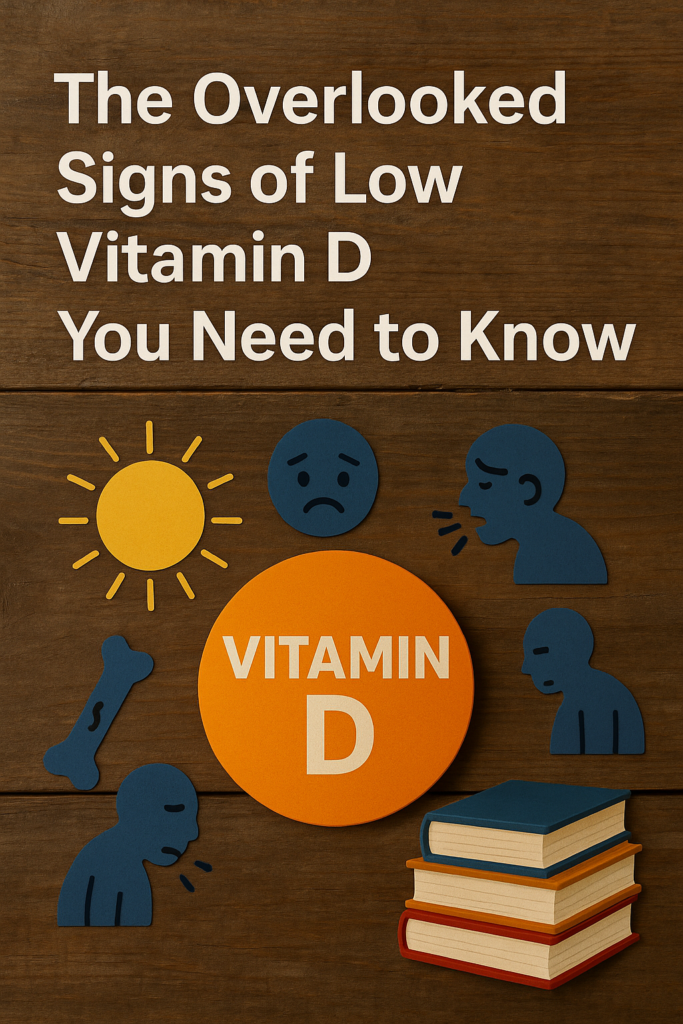
The Overlooked Signs of Low Vitamin D You Need to Know
When you hear about Vitamin D, you probably think of sunshine and strong bones.
But the reality is, Vitamin D does far more for your body than most people realize—and missing the early signs of a deficiency could be quietly sabotaging your health every day.
Vitamin D is a fat-soluble nutrient that acts like a hormone inside your body, influencing everything from immune strength to mood regulation, muscle function, and inflammation control.
It’s one of the few vitamins your body can produce naturally through sunlight exposure, but despite its importance, Vitamin D deficiency has become a worldwide health concern.
In fact, according to research from the National Institutes of Health, nearly 1 in 4 adults globally may have insufficient levels of Vitamin D—often without even knowing it.
The symptoms of low Vitamin D are easy to overlook because they often mimic everyday struggles: feeling tired, getting sick more often, aches and pains, low mood, or even difficulty losing weight.
Left unchecked, low Vitamin D can increase your risk for serious conditions such as osteoporosis, cardiovascular disease, autoimmune disorders, and chronic fatigue.
But the good news is: once you recognize the warning signs, you can take simple, effective steps to boost your Vitamin D levels and restore your energy, resilience, and well-being.
In this detailed guide, we’ll break down the overlooked signs of Vitamin D deficiency, explain why this vitamin is so crucial to your health, and show you exactly what you can do today to protect and optimize your vitality.
Let’s start by understanding why Vitamin D is absolutely essential for a thriving, energized life.
🌞 Why Vitamin D Is Essential
When you think about critical nutrients for overall health, Vitamin D should be at the top of your list.
Often called the “sunshine vitamin,” Vitamin D is unique because it acts more like a hormone than a traditional vitamin.
Every single cell in your body has a receptor for Vitamin D, which shows just how vital it is for your daily functioning and long-term well-being.
Yet, despite its importance, Vitamin D deficiency remains one of the most common and overlooked nutritional gaps worldwide.
Let’s explore exactly why Vitamin D is so essential:
1. Strengthens Bones and Teeth
One of the most well-known roles of Vitamin D is helping your body absorb calcium—the building block of bones and teeth.
Without sufficient Vitamin D, your body cannot properly utilize calcium from your diet, leading to bone softening (osteomalacia) in adults and rickets in children.
According to the National Institutes of Health, maintaining healthy Vitamin D levels is crucial in preventing fractures, osteoporosis, and other bone-related issues as you age.
2. Boosts Your Immune System
Vitamin D is a powerhouse when it comes to immune defense.
It enhances the pathogen-fighting effects of monocytes and macrophages—white blood cells that are critical parts of your immune system—and it decreases inflammation.
Emerging research, including studies in the Journal of Investigative Medicine, shows that individuals with optimal Vitamin D levels are less likely to suffer from infections like the common cold, influenza, and even respiratory illnesses.
Simply put: If you want your immune system firing on all cylinders, ensuring adequate Vitamin D intake is non-negotiable.
3. Supports Mental Health and Mood
Many people don’t realize that Vitamin D has a direct impact on mental health.
The brain contains Vitamin D receptors that help regulate mood and protect against mental decline.
Low Vitamin D levels have been linked to conditions such as:
- Depression
- Seasonal Affective Disorder (SAD)
- Anxiety
- Cognitive decline in aging adults
A meta-analysis in the British Journal of Psychiatry found that individuals with Vitamin D deficiency had significantly increased odds of depression.
This could explain why many people feel their energy and mood dip during the darker, colder months when sunlight exposure—and thus Vitamin D production—plummets.
4. Reduces Inflammation
Chronic inflammation is considered a silent killer, contributing to the development of heart disease, diabetes, cancer, and autoimmune conditions.
Vitamin D acts as a natural anti-inflammatory agent, helping to regulate inflammatory cytokines and reduce systemic inflammation throughout the body.
Maintaining adequate Vitamin D levels can help calm inflammation before it spirals into serious health complications, as suggested by research published in Frontiers in Immunology.
5. Promotes Heart Health
Emerging evidence links low Vitamin D levels to an increased risk of cardiovascular diseases such as hypertension, heart attack, and stroke.
Vitamin D helps maintain the health of the endothelium (the lining of blood vessels) and plays a role in regulating blood pressure.
According to a study in the American Journal of Cardiology, supplementing with Vitamin D may improve arterial stiffness and blood pressure in individuals with deficiency.
While more research is needed, supporting your cardiovascular system with optimal Vitamin D intake is a smart preventative strategy.
6. Supports Muscle Function
If you experience frequent muscle weakness, cramps, or even falls, Vitamin D could be a missing piece.
Vitamin D enhances muscle protein synthesis, strength, and overall performance.
A study in the Journal of Clinical Endocrinology & Metabolism found that supplementing Vitamin D in deficient individuals significantly improved muscle function and reduced the risk of falls, especially in older adults.
Whether you’re an athlete, a weekend warrior, or simply looking to stay active and independent, maintaining strong muscles with Vitamin D is crucial.
🌟 Quick Recap: What Happens Without Enough Vitamin D?
| Health Area | Effects of Low Vitamin D |
|---|---|
| Bones | Weak, brittle bones; higher fracture risk |
| Immunity | Increased infections and slower recovery |
| Mood | Higher risk of depression and anxiety |
| Inflammation | Greater likelihood of chronic diseases |
| Heart Health | Elevated blood pressure, artery damage |
| Muscles | Weakness, cramps, risk of falls |
🌞 Bottom Line:
Without enough Vitamin D, your body struggles to function at its best on virtually every level.
Making sure you get daily sunlight exposure, eating Vitamin D-rich foods, and considering a trusted Vitamin D3 supplement can help you stay healthy, energetic, and resilient.
Up Next: Let’s explore the sneaky symptoms that could be signaling you’re already running low on Vitamin D…
⚠️ The Overlooked Signs of Low Vitamin D

Vitamin D deficiency is often called the “silent epidemic” because its early signs are so subtle, they’re easy to miss or mistake for other issues.
Unlike obvious nutrient deficiencies that cause dramatic symptoms, low Vitamin D slowly chips away at your health over time—unless you know what to look for.
Here are the most commonly overlooked, but critical, warning signs that your body might be craving more Vitamin D:
1. Fatigue and Low Energy
Do you feel constantly drained, even when you’ve had enough sleep?
Persistent fatigue is one of the first—and most frequently missed—signs of low Vitamin D.
Because Vitamin D influences mitochondrial function (the energy factories inside your cells), low levels can leave you feeling sluggish and unmotivated.
According to a study published in The Journal of Clinical Sleep Medicine, individuals with chronic daytime sleepiness often had lower-than-optimal Vitamin D levels.
🔹 Helpful Tip:
Support your energy naturally by incorporating a daily Vitamin D3+K2 supplement to maximize absorption and restore vitality.
2. Frequent Illnesses and Infections
If you’re the person who catches every bug that goes around, it might not just be bad luck—it could be low Vitamin D.
Vitamin D helps regulate the production of antimicrobial peptides, natural substances in the body that fight off infections.
A meta-analysis published in the BMJ found that regular Vitamin D supplementation can reduce the risk of acute respiratory infections, especially in individuals who are deficient.
🔹 Helpful Tip:
Pair Vitamin D with immune-boosting nutrients like zinc and vitamin C for extra protection, especially during cold and flu season.
3. Bone, Joint, and Lower Back Pain
Chronic pain—especially deep bone aches or tenderness—is another sneaky indicator that you may need more Vitamin D.
Without enough Vitamin D, your body can’t properly regulate calcium and phosphorus, leading to demineralization of bones and subsequent discomfort.
Research published in Arthritis & Rheumatism noted a significant association between low Vitamin D and back pain severity.
🔹 Helpful Tip:
If you experience unexplained lower back pain, especially combined with muscle weakness, it’s wise to get your Vitamin D levels tested and start a bone support regimen including Vitamin D3 and magnesium.
4. Depression, Anxiety, and Mood Swings

There’s a strong mind-body connection when it comes to Vitamin D.
Deficiency has been linked not only to clinical depression but also to subtle mood disturbances such as irritability, lack of motivation, and mild anxiety.
Sunlight exposure—your natural source of Vitamin D—triggers serotonin release, a key hormone for happiness.
Without enough Vitamin D, serotonin production can falter.
The British Journal of Psychiatry concluded that low Vitamin D levels are associated with an increased risk of depression, especially during winter months.
🔹 Helpful Tip:
A Vitamin D3 supplement combined with adaptogens like ashwagandha can offer natural mood support without the side effects of medications.
5. Slow Wound Healing
If your cuts, scrapes, or surgical wounds seem to take forever to heal, a Vitamin D deficiency could be a hidden culprit.
Vitamin D promotes the production of compounds crucial to forming new skin during the wound healing process.
Research in Advances in Skin & Wound Care suggests that optimal Vitamin D levels accelerate the healing of both minor and major skin injuries.
🔹 Helpful Tip:
A skin health complex that combines Vitamin D, collagen peptides, and zinc can dramatically enhance your body’s natural healing response.
6. Hair Loss and Thinning Hair
Severe hair shedding—especially when paired with scalp tenderness or thinning—could signal low Vitamin D.
Vitamin D plays a role in the hair follicle life cycle, and deficiency can cause dormant follicles, leading to hair thinning and even alopecia areata.
A clinical study in Dermatology and Therapy found that women with diffuse hair loss had significantly lower Vitamin D levels than those without hair loss.
🔹 Helpful Tip:
Support hair growth from the inside out with a Vitamin D-enriched hair health supplement that also includes biotin and keratin for maximum results.
7. Muscle Weakness and Cramps
Frequent muscle aches, cramps, or overall weakness can often be traced back to low Vitamin D.
Because Vitamin D is crucial for muscle contraction and strength, insufficient levels impair performance and increase the risk of falls, particularly in older adults.
A trial published in the Journal of the American Geriatrics Society showed that supplementing Vitamin D significantly reduced the risk of falls in seniors.
🔹 Helpful Tip:
A high-absorption Vitamin D3 formula combined with magnesium can improve muscle function and reduce soreness.
8. Weight Gain and Difficulty Losing Weight
While weight management is complex, low Vitamin D can be an overlooked barrier to fat loss.
Studies suggest that individuals with low Vitamin D levels are more likely to have a higher body fat percentage and slower metabolism.
Vitamin D influences hormones involved in appetite regulation, including leptin—the hormone that signals fullness to your brain.
🔹 Helpful Tip:
Supporting your body with Vitamin D3 alongside a healthy lifestyle can make your weight loss efforts more effective and sustainable.
9. Gum Disease and Dental Issues
Healthy gums and teeth aren’t just about brushing and flossing—they also depend on good nutrition, including adequate Vitamin D.
Vitamin D supports bone density in your jaw and strengthens your immune response against harmful oral bacteria.
A study in The Journal of Periodontology found that individuals with higher Vitamin D levels had significantly lower risks of gum inflammation and periodontal disease.
🔹 Helpful Tip:
Protect your oral health by maintaining optimal Vitamin D levels through smart sun exposure, a nutrient-rich diet, and supplementation if needed.
⚡ Quick Signs Checklist
Here’s a fast self-check you can do:
| Symptom | Possible Link to Vitamin D |
|---|---|
| Constant fatigue | Impaired cellular energy production |
| Frequent infections | Weakened immune response |
| Bone or back pain | Poor calcium absorption |
| Mood changes | Serotonin dysregulation |
| Slow wound healing | Impaired skin regeneration |
| Hair loss | Follicle cycle disruption |
| Muscle cramps | Defective muscle contraction |
| Weight struggles | Hormonal imbalances |
| Gum disease | Bone weakness in the jaw |
If you checked off several of these, it might be time to investigate your Vitamin D levels with a simple blood test.
🌞 Key Takeaway:
Low Vitamin D doesn’t always scream for attention.
Instead, it whispers through everyday issues—ones that can easily be ignored until they grow into bigger problems.
Spotting these overlooked signs early gives you the power to take proactive steps for a healthier, more energized life.
🧪 How to Know If You’re Low in Vitamin D
If you’re experiencing any of these symptoms, it’s a good idea to get your Vitamin D levels tested.
A simple blood test called 25-hydroxyvitamin D (25(OH)D) is the most accurate way to assess your status.
Optimal Vitamin D levels are generally considered between 30–50 ng/mL for most people, although ideal ranges can vary based on individual needs.
Your healthcare provider can help you interpret your results and recommend a tailored supplementation plan if needed.
🌞 Best Sources of Vitamin D

While sunlight is the best natural source of Vitamin D, it’s not always enough—especially if you:
- Live in northern latitudes
- Wear sunscreen regularly
- Spend most of your time indoors
- Have darker skin (which reduces Vitamin D synthesis)
Here are some excellent ways to boost your Vitamin D intake:
| Food | Vitamin D Content (IU) |
|---|---|
| Fatty fish (salmon, mackerel, tuna) | 300–600 IU per serving |
| Fortified milk and dairy products | 100 IU per cup |
| Egg yolks | 40 IU per yolk |
| Mushrooms exposed to UV light | 400 IU per cup |
🔹 Helpful Tip:
Since it’s difficult to get enough Vitamin D from diet alone, many experts recommend adding a daily Vitamin D3 supplement — particularly during fall and winter months.
🛒 Highly Recommended Vitamin D Products
Here are a few highly rated options to help maintain healthy Vitamin D levels:
- Vitamin D3 + K2 Drops
(Excellent for quick absorption and superior bone and heart health support.) - Bone Strength Complex
(Combines Vitamin D, calcium, and magnesium in one easy-to-take formula.) - Immune Defense Gummies
(A convenient and tasty way to support immune function with Vitamin D, zinc, and elderberry.) - Mood and Stress Support Blend
(A smart combination of Vitamin D3, adaptogens, and B vitamins for emotional balance.)
📝
- 🧘 DAILY MOOD AND RELAXATION: Sync is an all-natural adaptogen mood supplement designed to be an all-in-one solution for …
- 🌿 INGREDIENTS: Ashwagandha, L-Theanine, Magnesium, Lemon Balm Extract, Bacopa Monnieri Extract, Passion Flower Extract, …
- 🌙 FIND YOUR BALANCE: With Sync you can naturally support a healthy night sleep and use to unwind after a long day at the…
Low Vitamin D levels are more widespread—and more harmful—than most people realize.
By paying attention to the overlooked signs like fatigue, bone pain, frequent infections, and mood swings, you can take proactive steps to protect your health.
Don’t wait for symptoms to worsen.
Test your Vitamin D levels, optimize your intake, and consider adding high-quality supplements to your daily routine if needed.
Remember: Small steps today could mean a stronger, healthier you tomorrow.
📚 References
- National Institutes of Health Office of Dietary Supplements. Vitamin D Fact Sheet for Health Professionals.
- Martineau AR, et al. (2017). Vitamin D supplementation to prevent acute respiratory tract infections: systematic review and meta-analysis of individual participant data. BMJ.
- Kjærgaard M, et al. (2012). Effect of vitamin D supplement on depression scores in people with low levels of serum 25-hydroxyvitamin D. British Journal of Psychiatry.
- McCarty DE. (2010). Resolution of Hypersomnia Following Identification and Treatment of Vitamin D Deficiency. Journal of Clinical Sleep Medicine.
- Dietrich T, et al. (2005). Association between serum concentrations of 25-hydroxyvitamin D and periodontal disease in the US population. American Journal of Clinical Nutrition.
Related Articles:
Overnight Oats Are Back—This Time with a Superfood Twist
As an Amazon Associate, I earn from qualifying purchases.




